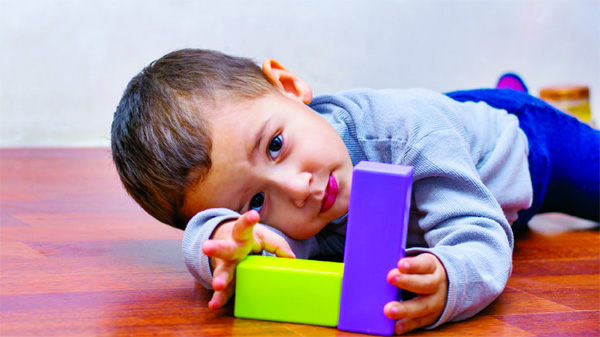
Weekend Plus Desk :
n the world, autism is generally misdiagnosed and misunderstood due to the low awareness and misconceptions surrounding it. The diagnosis of children with autism is done late, which results in challenging treatment, and the cure seems to be impossible.
Dr R K Jain, senior consultant, pediatrics neurology at Fortis Memorial Research Institute, Gurugram helps with a few rag flags signs that will help parents identify autism.
How do parents identify the features of autism?
Early detection of patients with autism is difficult mainly due to unawareness. We hardly see any cases of autism in infancy because the diagnosis is not there. So in case your child is showing repetitive behaviour is self-abusing or biting or head-banging, it should be taken as the first signs of autism.
The development of child will be normal but the social engagement of the child will be delayed. In some cases the deformity or slow growth of muscles could be your prime sign of autism, coupled with no social engagement.
Children with autism start speaking later than other children and their interaction with other similar-aged children is on the lower side. In some cases, autism may co-occur with genetic conditions and about 20-30 per cent of children with autism may develop epilepsy as they reach adulthood.
What are the red flag symptoms?
Very early indicators that require evaluation by an expert include:
*Delayed babbling or pointing by age of 1
*No single meaningful word by 16 months, or two-word phrases by the age of 2
*Delayed or no response to name
*Loss of language or social skills
*Poor eye contact
*Excessive lining up of toys or objects
*No smiling or social responsiveness
*Restricted interest like playing with cars, spinning, using gadgets
*Repetitive movements like hand flapping, posturing
*If your child plugs their ears when they hear high pitched noises like mixer, vacuum cleaner, pressure cooker whistle
*Difficulty in chewing, and fussy eating with some food texture like meat, soya or paneer
If you find any of these features in your child, please consult the local pediatrician or child neurologist who can assess your child in detail.
While there is no single blood test to diagnose autism, the doctor needs to look into certain disorders in which children have similar features in addition to other signs of that disorder, like Tuberous sclerosis, Landau-kleffner syndrome (a form of epilepsy), other childhood epilepsies, some metabolic and genetic disease to diagnose further.
The doctor will conduct some blood tests, hearing assessment, or EEG depending upon the presenting features and assessment.
n the world, autism is generally misdiagnosed and misunderstood due to the low awareness and misconceptions surrounding it. The diagnosis of children with autism is done late, which results in challenging treatment, and the cure seems to be impossible.
Dr R K Jain, senior consultant, pediatrics neurology at Fortis Memorial Research Institute, Gurugram helps with a few rag flags signs that will help parents identify autism.
How do parents identify the features of autism?
Early detection of patients with autism is difficult mainly due to unawareness. We hardly see any cases of autism in infancy because the diagnosis is not there. So in case your child is showing repetitive behaviour is self-abusing or biting or head-banging, it should be taken as the first signs of autism.
The development of child will be normal but the social engagement of the child will be delayed. In some cases the deformity or slow growth of muscles could be your prime sign of autism, coupled with no social engagement.
Children with autism start speaking later than other children and their interaction with other similar-aged children is on the lower side. In some cases, autism may co-occur with genetic conditions and about 20-30 per cent of children with autism may develop epilepsy as they reach adulthood.
What are the red flag symptoms?
Very early indicators that require evaluation by an expert include:
*Delayed babbling or pointing by age of 1
*No single meaningful word by 16 months, or two-word phrases by the age of 2
*Delayed or no response to name
*Loss of language or social skills
*Poor eye contact
*Excessive lining up of toys or objects
*No smiling or social responsiveness
*Restricted interest like playing with cars, spinning, using gadgets
*Repetitive movements like hand flapping, posturing
*If your child plugs their ears when they hear high pitched noises like mixer, vacuum cleaner, pressure cooker whistle
*Difficulty in chewing, and fussy eating with some food texture like meat, soya or paneer
If you find any of these features in your child, please consult the local pediatrician or child neurologist who can assess your child in detail.
While there is no single blood test to diagnose autism, the doctor needs to look into certain disorders in which children have similar features in addition to other signs of that disorder, like Tuberous sclerosis, Landau-kleffner syndrome (a form of epilepsy), other childhood epilepsies, some metabolic and genetic disease to diagnose further.
The doctor will conduct some blood tests, hearing assessment, or EEG depending upon the presenting features and assessment.

